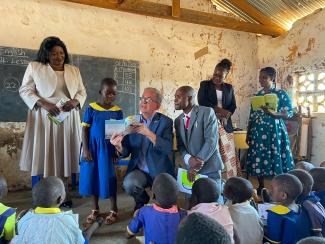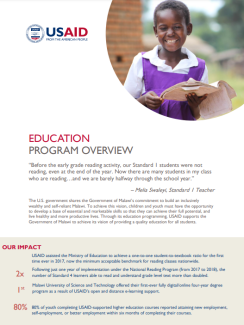Program Overview
“Before the early grade reading activity, our Standard 1 students were not reading, even at the end of the year. Now there are many students in my class who are reading...and we are barely halfway through the school year.”
– Melia Swaleyi, Standard 1 Teacher
The U.S. government shares the Government of Malawi’s commitment to build an inclusively wealthy and self-reliant Malawi. To achieve this vision, children and youth must have the opportunity to develop a base of essential and marketable skills so that they can achieve their full potential, and live healthy and more productive lives. Through its education programming, USAID supports the Government of Malawi to achieve its vision of providing a quality education for all students.
Approach
Following the introduction of free primary education in 1994, the Government of Malawi has made significant progress towards education reform. High enrolment rates and increasing demands on the system, however, have also led to huge class sizes and an inadequate supply of infrastructure, teachers, and teaching and learning materials–leading to extremely poor student performance, particularly in the area of literacy.
USAID works with the Ministry of Education and other development partners at each level of education, focusing on reading in the early grades to provide foundational, quality education; equitable access to secondary education, especially for adolescent girls and young women and marginalized and vulnerable youth; and strengthening higher education institutions in Malawi to create the next generation of Malawi’s leaders and a workforce to spur industry and socio-economic growth.
Results
- Since 2016, the U.S. government, through USAID, has invested over $114 million to support the implementation of the National Reading Program in all 5,800+ public primary schools nationwide to increase the quality of foundational learning (and especially early grade reading) for all children, including learners with disabilities.
- This investment includes curriculum development for Standards 1-8, training over 76,000 teachers and administrators in early grade reading instruction and inclusive education, and printing and distributing over 24 million books for teachers and all learners in every Malawian classroom nationwide.
- The U.S. government, through USAID and PEPFAR, invested $90 million to expand 30 existing urban Community Day Secondary Schools (CDSS) and construct new CDSS in every District nationwide. So far, 96 classrooms were constructed and handed over, benefitting more than 6,550 students. Construction of 38 new, greenfield CDSS are currently under construction, and a solicitation is out for an additional 51 schools right now.
- USAID has supported all five public universities to expand access to higher education, especially for vulnerable learners, including young women and learners with disabilities, through technological solutions and open and distance e-learning. More than 1,700 learners have benefitted from scholarships and/or bridging support to date.

USAID

